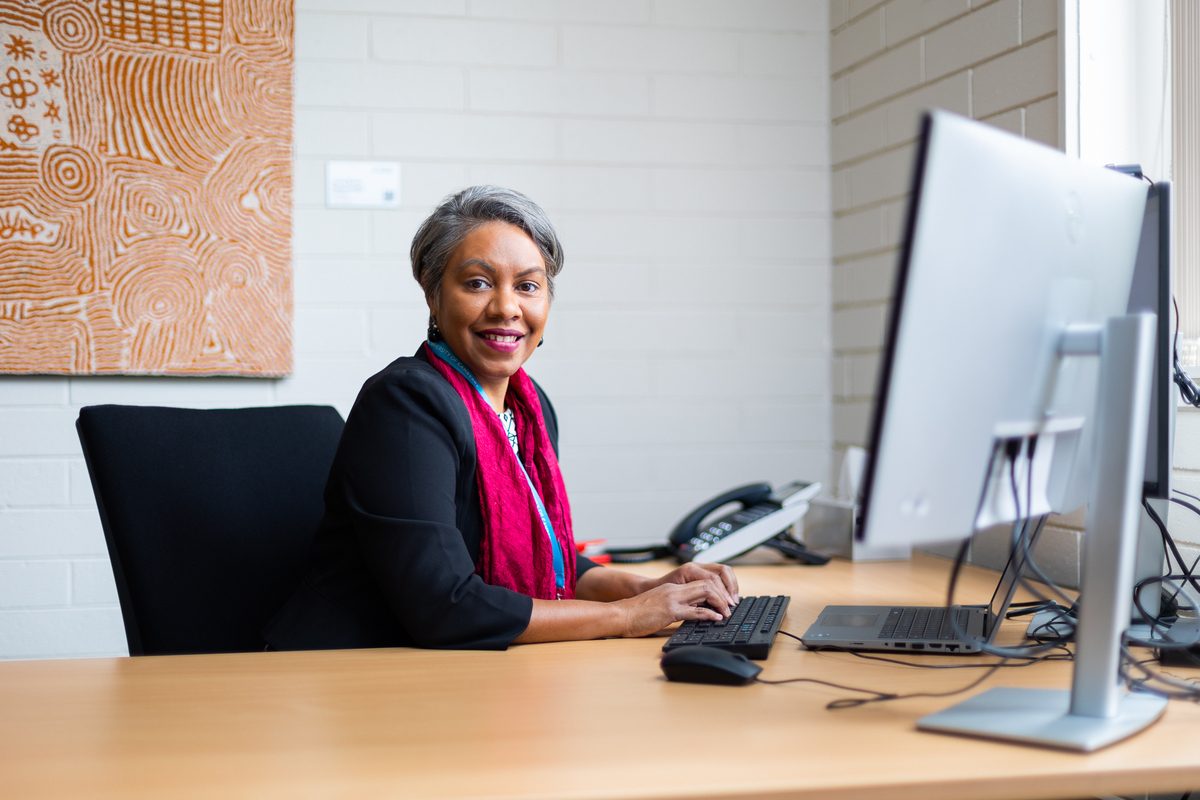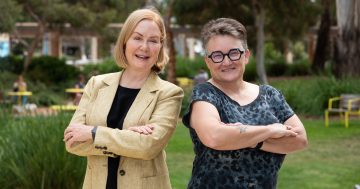
Having been appointed Pro Vice-Chancellor Indigenous Leadership at the University of Canberra, Maree Meredith will work to promote Indigenous interests at the learning institute. Photo: Tyler Cherry.
Conversations around the Voice to Parliament were a magnet that drew Bidjura woman Maree Meredith to the nation’s capital.
She had worked in educational facilities around the country, including areas of high Indigenous population in the Northern Territory and Central Australia, but left Flinders University in Darwin to join the University of Canberra (UC) as the Pro Vice-Chancellor (Indigenous Leadership).
She said the university’s renaming of the role to Pro Vice-Chancellor Indigenous Leadership and its restructure to part of the Vice-Chancellor’s office were a nod to the promotion of First Nation interests at UC.
“There is a clear commitment to the proliferation of Indigenous and Torres Strait Islander interests at UC,” she said.
“There’s also recognition of our responsibility as an Australian learning institution to embed the Indigenous perspectives in our operations.”
Hers is a strategic role, prioritising Indigenous staff and students’ interests from recruitment and retention to engagement and advocacy.
This includes oversight on the delivery of the university’s Reconciliation Action Plan and the development and implementation of the Aboriginal and Torres Strait Islander Strategic Plan.
The latter is one of a handful of significant institutional strategies and plans that will inform and support the university’s broader 10-year Connected strategy launched late last year.
The Connected strategy aims to position UC to become the most accessible university in Australia and a global leader in driving equal opportunities.
“It’s about partnering with our students, faculties and the broader Canberra community to achieve cultural, social and economic success, and positioning ourselves as the university of choice for the ACT,” Professor Meredith said.
“The strategies I oversee will focus on the Indigenous priorities in this big picture and play a significant role in their achievement.”
For example, the university has pledged to demonstrate “an unwavering commitment to reducing barriers” for people to access university education. A key measure of that will be Indigenous student and staff participation.
Prof. Meredith’s team is already working on the university’s NAIDOC activations, but one external piece of advocacy has her particular attention right now – a series of the Voice to Parliament public lectures.
“One of the main reasons I wanted to come to Canberra was to be part of the conversations and dialogue around The Voice,” she said.
“UC is an important institution that I believe will play a vital role in those conversations.
“We’re an institution of knowledge and information; we have a duty to staff and students, but also must understand our civic responsibility and the role we must play in informing the public.
“We have a number of speakers lined up for our series of lectures as an opportunity for students, staff and the public to hear key voices and perspectives on The Voice in the lead-up to the referendum.”
Former Shadow Minister for Indigenous Affairs Julian Leeser, who resigned from the front bench due to the Liberal Party’s “no” stance on The Voice, delivered UC’s inaugural Voice to Parliament Lecture. Another will come from NACCHO (National Aboriginal Community Controlled Health Organisation) CEO Pat Turner.
The series follows a forum session hosted by the Student Representative Council at the UC Refectory last month, where prominent advocate for The Voice Thomas Mayor became an impromptu speaker.
“It attracted strong student engagement and showed us there was enormous appetite among students, staff and the broader Canberra community,” Prof. Meredith said.
“That’s what prompted us to go into this space.”
Engaging with external parties, including the public, will be essential to Prof. Meredith’s mission.
“Part of the new strategies I am developing will look to bring the community in as equal partners, specifically around Aboriginal and Torres Strait Islander priorities,” she said.
“I’m looking to establish and renew relationships and partnerships with crucial allies.
“We’re starting at a low base in terms of student and staff numbers, but there’s a strong commitment to change here. We can put down solid foundations to be in a strong position to capture emerging opportunities.
“At this early stage, vision and representation become critical. The right leadership will be essential and that includes seeing Indigenous representation at every level of the university.
“It’s that old adage – you can’t be what you can’t see. We want to ensure staff and students can see both beginnings and futures at UC.”
Original Article published by Dione David on Riotact.








I have read this story thoroughly a number of times and still can't work out what Ms Gorman's… View